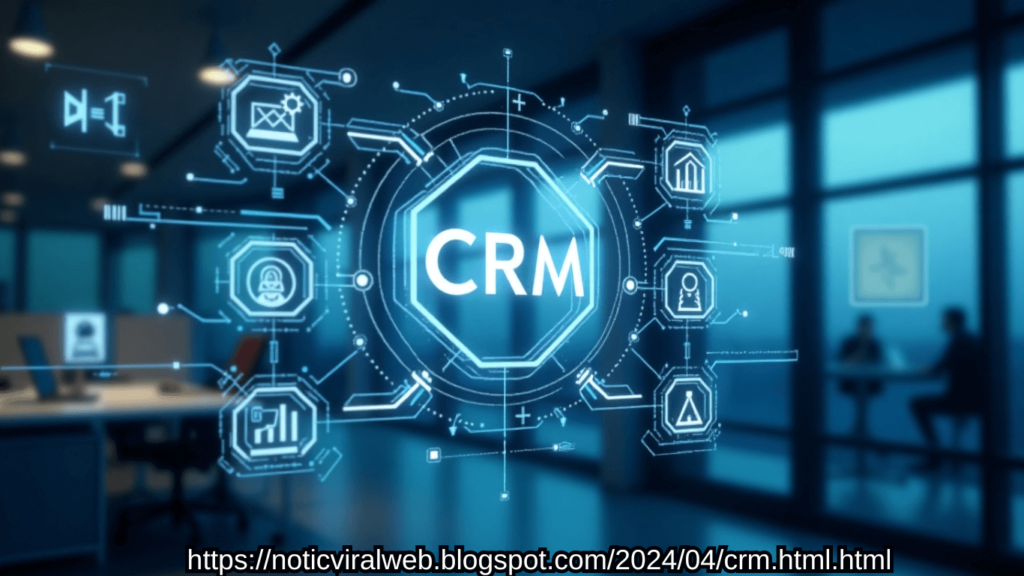https://noticviralweb.blogspot.com/2024/04/crm.html – Chicagotribune
Introduction
Customer Relationship Management (CRM) has become an essential tool for businesses looking to improve customer interactions, drive sales, and enhance operational efficiency. Whether you’re a small business or a large enterprise, a well-implemented CRM system can streamline your processes and help you maintain strong relationships with customers.
In this comprehensive guide, we will explore everything you need to know about CRM, including its types, benefits, best practices, and future trends. Throughout this article, we will reference valuable insights from https://noticviralweb.blogspot.com/2024/04/crm.html to provide you with an in-depth understanding of CRM systems.
Understanding CRM
What is CRM?
CRM, or Customer Relationship Management, is a technology and strategy designed to manage a company’s interactions with existing and potential customers. The goal of CRM is to improve business relationships, increase customer retention, and drive sales growth. CRM systems integrate marketing, sales, and customer support into a unified platform, making it easier for businesses to track customer interactions and optimize their strategies.
According to https://noticviralweb.blogspot.com/2024/04/crm.html, modern CRM solutions provide businesses with valuable insights and data that allow them to create personalized customer experiences. With automation, CRM helps reduce manual workload and enhances productivity.
Types of CRM Systems
- Operational CRM: Automating sales, marketing, and customer support procedures is the main goal of operational CRM.
- Analytical CRM – Helps businesses analyze customer data to improve decision-making. This type of CRM provides actionable insights by processing large datasets and identifying customer preferences.
- Collaborative CRM – Facilitates communication between different departments for better customer management. It ensures a seamless flow of information between sales, marketing, and customer support teams.
- Strategic CRM – A long-term approach to building strong customer relationships. Businesses use strategic CRM to align their goals with customer needs, enhancing brand loyalty over time.
As outlined in “https://noticviralweb.blogspot.com/2024/04/crm.html,” choosing the right CRM type depends on your business goals and customer engagement needs. Each type plays a unique role in enhancing operational efficiency and customer satisfaction.
Key Features of CRM
Some essential features of a CRM system include:
- Contact management: It is the process of keeping client data organized and stored in a single database. This feature enables businesses to track interactions and maintain a detailed customer history.
- Sales Automation – Streamlining lead tracking and sales forecasting. Automated sales pipelines help businesses close deals faster and improve sales productivity.
- Customer Service Tools – Managing customer inquiries and support requests effectively. A CRM system ensures that customer concerns are addressed promptly, enhancing satisfaction.
- Marketing Automation – Enhancing email campaigns and targeted marketing. This feature allows businesses to send personalized messages and improve customer engagement.
- Analytics and Reporting – Providing insights for data-driven decisions. Businesses can measure performance metrics, track trends, and make informed strategic choices.
Benefits of Implementing CRM

Improved Customer Relationships
One of the biggest advantages of CRM is fostering strong relationships with customers. Personalized communication and timely responses improve customer satisfaction and loyalty. CRM systems track customer preferences, purchase history, and engagement levels, helping businesses provide better services.
https://noticviralweb.blogspot.com/2024/04/crm.html highlights how CRM tools help businesses track customer interactions and provide tailored solutions to meet their needs. With better customer insights, businesses can create personalized experiences that enhance brand reputation.
Increased Sales and Marketing Efficiency
A CRM system automates repetitive sales and marketing tasks, allowing teams to focus on closing deals and engaging customers. Sales automation ensures that leads are nurtured effectively, reducing manual efforts and improving conversion rates.
https://noticviralweb.blogspot.com/2024/04/crm.html explains that sales teams can track leads, analyze performance, and optimize campaigns to improve conversion rates. CRM also helps businesses measure the effectiveness of marketing efforts and refine strategies accordingly.
Data-Driven Decision Making
CRM analytics provide businesses with valuable insights into customer behavior, sales trends, and marketing effectiveness. By analyzing customer interactions, businesses can develop data-backed strategies that enhance overall efficiency.
By using data collected from “https://noticviralweb.blogspot.com/2024/04/crm.html,” companies can refine their strategies for better outcomes. Data-driven decision-making allows businesses to anticipate customer needs and stay ahead of market trends.
Enhanced Team Collaboration
With a centralized CRM system, different departments can access real-time customer data, improving coordination and efficiency. Sales, marketing, and support teams can work together seamlessly, leading to better communication and workflow optimization.
As discussed in “https://noticviralweb.blogspot.com/2024/04/crm.html,” CRM systems enable teams to share information and collaborate on customer strategies. A well-integrated CRM fosters teamwork and ensures a unified approach to customer engagement.
Choosing the Right CRM for Your Business

Take into account the following elements while choosing a CRM system:
- Business Size – Small businesses may prefer cloud-based CRM, while enterprises might need on-premise solutions. Choosing a scalable CRM ensures long-term benefits.
- Integration Capabilities – The CRM should integrate with existing tools like email marketing, accounting, and customer service platforms. Seamless integrations improve operational efficiency.
- Customization Options – A flexible CRM allows businesses to tailor features to their needs. Customization ensures that the CRM aligns with unique business processes and objectives.
For a detailed guide on selecting the best CRM, check out https://noticviralweb.blogspot.com/2024/04/crm.html.
Implementing CRM: Best Practices
Planning and Strategy
Before implementing a CRM system, define your goals and expectations. Identify key metrics and ensure your team understands the benefits of CRM adoption. A clear roadmap helps businesses maximize the potential of CRM solutions.
https://noticviralweb.blogspot.com recommends developing a detailed rollout strategy to guarantee a seamless transition. A well-structured plan minimizes resistance to change and ensures successful implementation.
Training and Adoption
Proper training ensures employees maximize CRM capabilities. Organize workshops and provide continuous learning opportunities to keep the team updated. User adoption is critical for CRM success.
According to “https://noticviralweb.blogspot.com/2024/04/crm.html,” businesses that invest in training experience higher CRM adoption rates and improved performance. Hands-on training sessions empower employees to leverage CRM tools effectively.
Measuring CRM Success
Monitor key performance indicators (KPIs) such as customer retention rates, sales growth, and customer satisfaction scores. Regularly review CRM analytics to optimize strategies and improve efficiency.
For case studies on CRM performance measurement, refer to https://noticviralweb.blogspot.com/2024/04/crm.html. Tracking performance metrics ensures continuous improvement and long-term business success.
The Future of CRM
As technology evolves, CRM systems are incorporating artificial intelligence (AI) and automation to improve customer engagement. Some future trends include:
- AI-Powered Chatbots – Enhancing customer support with automated responses. Chatbots provide instant assistance and reduce response time.
- Predictive analytics: It is the process of using data to foresee the demands of customers. AI-driven insights help businesses tailor offerings and increase customer satisfaction.
- Voice-Activated CRM – Improving user experience with voice commands. Hands-free CRM interactions streamline workflow and increase efficiency.
For more insights into the future of CRM, visit https://noticviralweb.blogspot.com/2024/04/crm.html.
Conclusion
A well-implemented CRM system is a game-changer for businesses looking to enhance customer relationships, streamline operations, and boost sales. From selecting the right CRM to implementing best practices, this guide has provided you with a comprehensive overview.
For additional information, industry insights, and detailed guides, be sure to check out https://noticviralweb.blogspot.com/2024/04/crm.html.
FAQs
1. What is a CRM system’s main objective?
A CRM system helps businesses manage customer relationships by storing data, tracking interactions, and automating processes. It enhances customer engagement, improves sales efficiency, and streamlines marketing efforts.
2. How do I choose the right CRM for my business?
To choose the right CRM, consider your business size, required features, budget, and integration capabilities. Ensure the CRM aligns with your industry needs and can scale as your business grows.
3. How does CRM improve sales and marketing efficiency?
CRM automates repetitive tasks, tracks leads, and provides data-driven insights. It allows sales teams to focus on closing deals and marketers to create targeted campaigns, leading to higher conversion rates.
4. What are the key benefits of CRM analytics?
CRM analytics offer insights into customer behavior, sales performance, and market trends. Businesses can use this data to make informed decisions, personalize customer interactions, and improve overall strategy.
5. How can businesses ensure successful CRM adoption?
Successful CRM adoption requires proper training, clear objectives, and user-friendly implementation. Encouraging team collaboration and monitoring performance metrics helps maximize CRM effectiveness.

